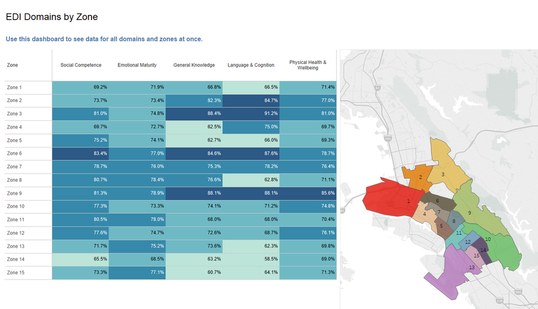EARLY DEVELOPMENT INSTRUMENT:
Using community data to support early learning
|
Did you know that neighborhood-specific information is available for the wellbeing of Oakland’s youngest children?
Oakland has a great new data source — the Early Development Instrument (EDI). This tool gives us a way to explore, from a neighborhood level, what’s most important for the children right in that place. |
Oakland kindergarten teachers observed and assessed their students, and we organized that information by neighborhood (not by individual child). That means that EDI is a snapshot of young children's health, development, and school readiness within each “zone” or neighborhood.
You can get all of this information - maps, data, outcomes - here on the Oakland Early Childhood Ecosystem Data Portal. It includes an interactive dashboard that allows teachers, families, neighbors, and policymakers to see where children are thriving or struggling across the city.
You can get all of this information - maps, data, outcomes - here on the Oakland Early Childhood Ecosystem Data Portal. It includes an interactive dashboard that allows teachers, families, neighbors, and policymakers to see where children are thriving or struggling across the city.
Using Information to Support Thriving Children in Every Neighborhood
Who is the EDI for?
The EDI data is for everyone who wants to improve conditions for children in Oakland. Here are some ideas about what you can do with these data.
Please reach out if you’d like to partner with us in spreading the word about the EDI and using the data to drive action!
Contact [email protected].
Who is the EDI for?
The EDI data is for everyone who wants to improve conditions for children in Oakland. Here are some ideas about what you can do with these data.
- Parents can use EDI results to identify what’s working well in their neighborhoods and where there are gaps in services, as well as push for programs and services that support child learning and health. Parents can also speak out at school and school board meetings and at city council so that the learning and wellbeing of the children in their own neighborhoods are prioritized in public policy-making around health, education, housing, public safety and family support.
- Educators can use EDI to inform curriculum and teaching strategies, enhance communication with families, justify increases in ECE slots & centers, and improve school transition and alignment activities between preschool & kindergarten.
- Service providers can use EDI to inform their own strategic plans, inform grant writing, and promote effective coordination and collaboration with other partnering organizations and initiatives.
- Policymakers can use EDI to facilitate community mobilization to create a “young children’s agenda.” EDI can elevate, improve and align early childhood activities, investments and policies across citywide efforts for equitable systemic change.
Funders can use EDI results to improve grant-making, needs assessments and other activities that benefit from real local data.
Please reach out if you’d like to partner with us in spreading the word about the EDI and using the data to drive action!
Contact [email protected].

